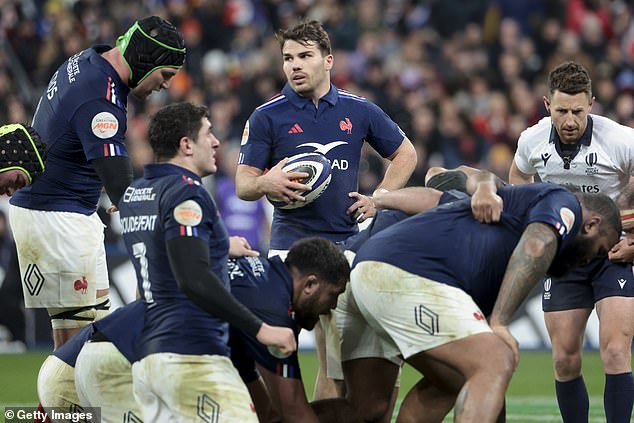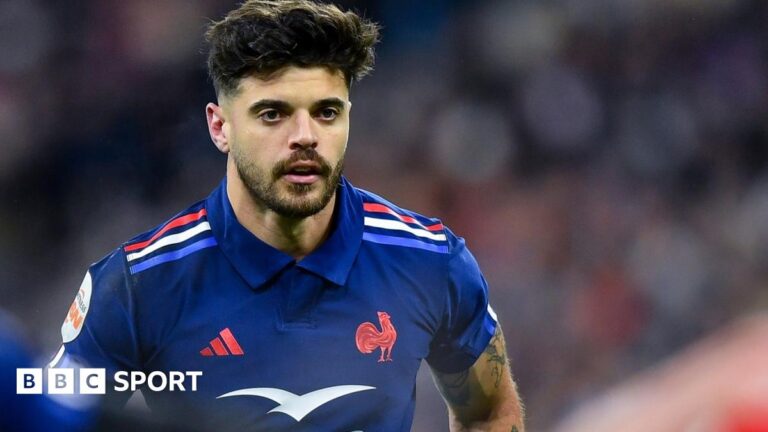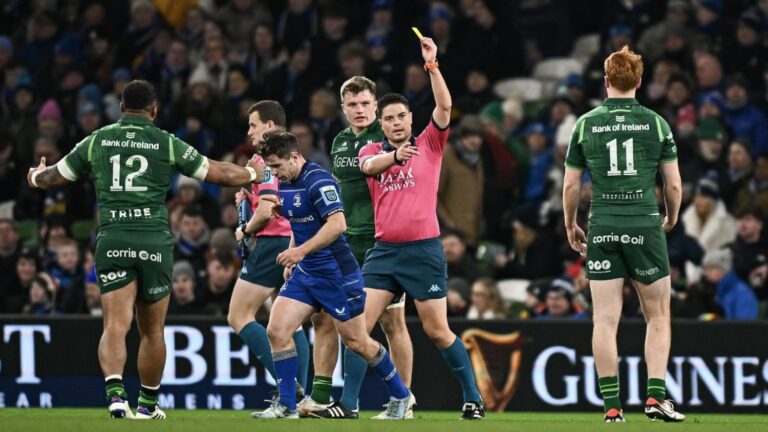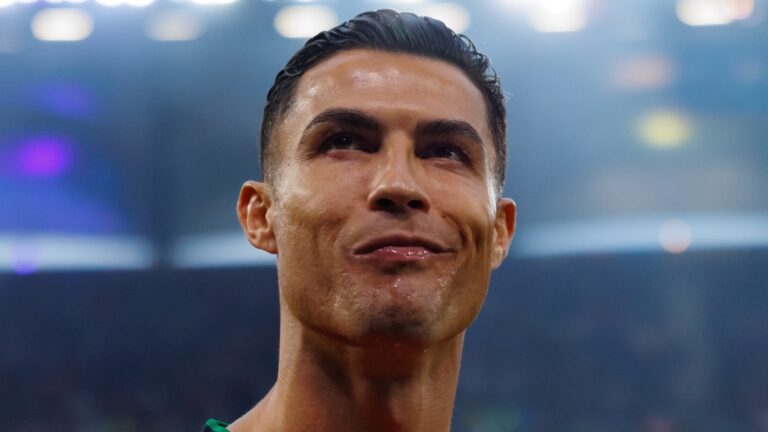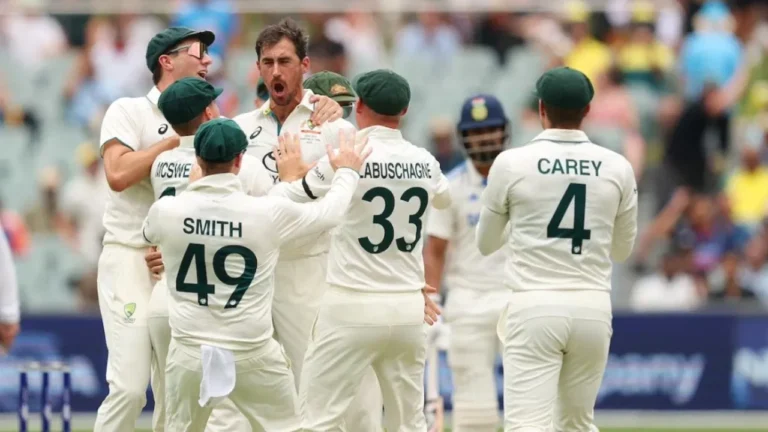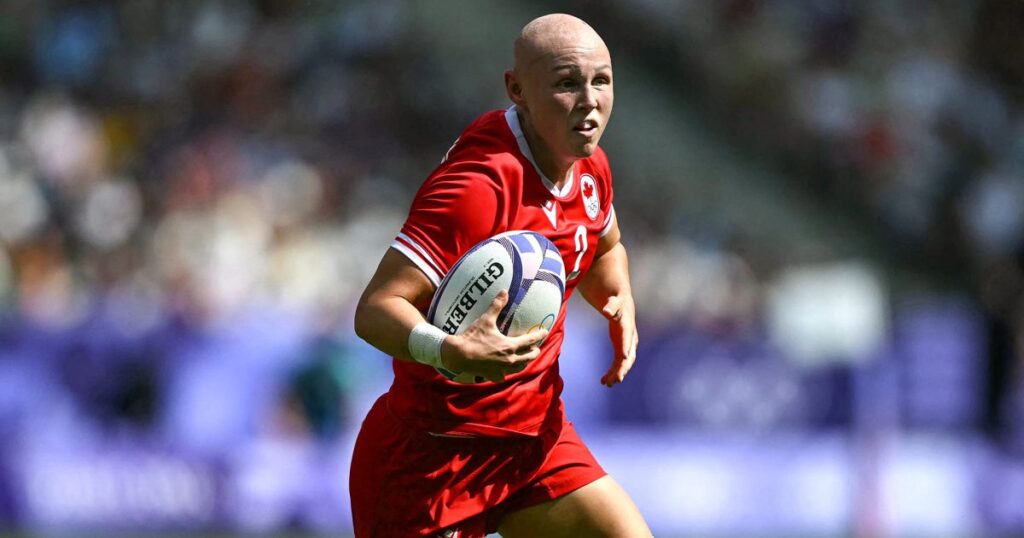
Olivia Apps has become a figurehead for Canada’s women’s rugby programme in recent years.
The 26-year-old has thrived on both the sevens and 15s scenes, with 2024 a year in which Canada was at the forefront – perhaps more than ever – for rugby’s cognoscenti.
A historic first-ever win over New Zealand propelled Kévin Rouet’s team to the Pacific Four Series title in May and two months later, when facing the same country in the gold-medal match, the sevens team earned an Olympic sevens silver medal.
‘This Energy Never Stops’ – Women’s Rugby World Cup 2025
Apps was at the heart of both, and under Paris skies, captained the side to their best finish to date at an Olympic Games. Since making her Canada sevens debut in 2018, she’s represented her country at two Olympic Games, on the SVNS Series, at the Sevens Rugby World Cup, and made her 15s debut in 2023 which has resulted in multiple WXV and Pacific Four Series appearances since.
In 2025 there’s the opportunity for a new chapter to be written in Apps’ story as the biggest Women’s Rugby World Cup to date looms on the horizon.
However, despite the nation winning the bronze medal at Rio 2016 as well as being Women’s Rugby World Cup finalists in 15s back in 2014, one of only four countries to have done so, rugby in Canada is still very much a growing sport – which was massively propelled by their Olympic silver last summer.
“Defintely a lot of fans that have watched rugby for the first time, that was Paris. They’ll tell me ‘Oh my gosh, I didn’t even know rugby existed and then I saw you guys play’, which is really cool. I love that for the first time they’re watching rugby, they’re watching the Canadian women play in an Olympic final,” Apps said.
“For young players, the amount of fans that I hear ‘You guys are an inspiration, we love watching you play’, for women’s rugby especially there’s a bit of that grit and there’s emotion there that connects with people. The way that the team play really connected with a lot of people, it really impacted them. Hearing those messages from fans especially has been has been consistent.
“It’s a bit strange because when I tell people it’s actually the second Olympic medal for rugby sevens for women they sort of go ‘Woah, I had no idea’. It’s half frustrating because you want Canadians to embrace this sport that we’re really good at and buy in, and go to BC Place and watch us play [at WXV] and all of those things, it’s just not quite there yet.
“I think with this Olympic medal win, and with the success, even after PAC 4 when we beat New Zealand, the amount of people who came up to us and said ‘Oh my gosh you guys are incredible, I watched that game’. When it actually gets aired on television I feel like people watch, and they care, and they get inspired by the way we play. I hope that as it continues, we can have more exposure in Canada. People love rugby, it’s an impressive sport, they just need to see it more.”
Three years prior to their silver medal in Paris, Canada faired far worse at the Olympics in Tokyo, failing to upgrade from their bronze medal in the previous Olympic cycle, finishing a disappointing ninth.
Having worked through the highs and lows of their rebuilding phase after Tokyo, the moment when the silver medal was placed around Apps’s neck at the Stade de France was far more than the sum of their 2024 Olympic campaign, and indeed held more weight for the future of the programme.
“It was pretty surreal [being presented with the silver medal],” Ontario native Apps said. “It was mixed emotions because we had just played New Zealand where we had just lost the gold. In some ways, I felt like we really could have done it. I know people weren’t expecting us to win that game but we were so close and that was definitely a bit disappointing that we had come so close.
“Also, I felt so proud that we had that silver and had really put the programme back in a strong place heading into the next quad, because Tokyo we left it pretty wounded from our ninth-place finish there. To be able to feel confident about us, how we rebuilt the programme in the past three years, standing on that podium, having our friends and family celebrate with us, they can celebrate their win as much as it’s our win and our accomplishment, was really special. It’s hard to put into words probably how it impacts the nation, but for us we were really proud.
“It’s so many things that I think reflecting on the last three years, obviously from Tokyo it was definitely a rebuild that happens in teams regularly, but for us we just had such a drastic drop off of players and experience that in the first year it seemed really exciting, okay we have all of these new caps, and then in the second year when you are expecting things to pick up and performance to continue going in a positive direction and we come ninth and it just is really challenging mentally to find the motivation or belief.
“A lot of it comes down to the coaching staff and the organisation, the belief that they had in us and the ability to allow in so many young players to get experience time and time again. Sometimes some players get one or two chances and it’s really hard to crack into a team, but for us, we were all building together and all learning at the same time.
“The adversity that we faced in those first two years and a lot of the challenges that we had really allowed us to come together as a group and really play in Paris with no pressure and nothing to lose because we were seen as the underdogs. For us, that really helped and allowed us to really enjoy and express ourselves without really feeling the pressure of the games.”
Rather reminiscent of the scenes ten years prior at the 15s Women’s Rugby World Cup, Canada’s path to the Olympic final also involved defeating home side France in the knock-outs. Their path to the silver medal then saw them come up against Australia in the semi-final, which when faced with a green and gold team who were favourites for a medal prior to the tournament, meant Canada entered into the match as relative underdogs.
“We were definitely rolling from our confidence from the quarter-final against France and feeling pretty unstoppable [going into the semi-final],” the captain said. “If we were able to conquer that, and play the hosts at home, then we were able to do anything. I don’t think the opponent really mattered, but Australia for us is an opponent that we do understand a bit more how to beat them, or we have a game play that can work.
“For us, we had to go in really confident but we had to be dialled in in our defensive systems and the tactical side of the game, it was different from how we had to play against a New Zealand or a Fiji or a China. We knew how to play them and we had our game plan, and we knew if we stuck to it we could find an outcome.
“The Stade de France was incredible. Compared to Tokyo, which didn’t have fans, it was so special to be able to find out you’re going to win an Olympic medal and be able to celebrate with your friends and family right away and having them right there.
“It was a really exciting rugby crowd that loved to watch the game, and you could tell because they were silent when plays were happening or when a conversion was being kicked, they were respectful, you could tell that they were actually there for the games which was really cool.”
Canada is one of the few countries where, rather unconventionally perhaps, the advancement of their women’s rugby side is well ahead of their male counterparts when it comes to visibility on the global stage. Despite the women’s team’s success, there is still a way for both teams – particularly when it comes to funding.
“It’s definitely an interesting place to be because not a lot of nations I would say have a similar situation with their men’s team,” Apps pondered.
“For us as Rugby Canada, the better that we can do on both sides, the better for the organisation. It showcases a lot of how the women’s team has faced a lot of adversity and still having to pay to play until relatively recently, we don’t have professional contracts, we are travelling overseas to play.
“We face a lot of adversity because we want to play the game and we put everything into it. I think that’s allowed us to have success now. With the men’s side of things, I think they have belief like from our side of things, we have belief in them, it’s going to take a lot of work but for sure with time if they continue on the same mindset that they’re on and with the same leadership we have in Rugby Canada I think that we’ll find success soon.
Canada’s ‘One Squad’ focus seems to have been a key component of their success of late. Apps in particular, along with the likes of Fancy Bermudez, have been proponents of the strength of the programme with One Squad at the heart, both being involved in the successful Pacific Four Series as well as the Olympics, and later WXV on home soil. Alongside their silver medal in Paris, their exploits in New Zealand in May 2024 surely stand as another highlight of their rugby careers thus far.
“It was incredible. To be able to play them at home and beat them was pretty unforgettable,” she said. “Our whole PAC 4 journey was really special because we were building from game to game. With this team now that we have at WXV, we have such a strong 30 that we’re giving lots of players the opportunity to play, to get experience in the build-up to the World Cup.
“We’re still getting the outcomes that we wanted and still getting the wins and the performances, so I think that’s really cool to be able to get people experience and also get the wins at the same time.
With another massive year for women’s rugby already well underway, Apps is currently out in Perth preparing for round three of the HSBC SVNS, with securing a spot at the upcoming 15s World Cup a key focus.
She said: “I would love to be part of the Rugby World Cup 2025 squad. This team came so close in New Zealand and losing to England by seven points I know they were super gutted and it’s been a big motivation for us in the last three years. Rebuilding from that is how to be in that World Cup final so I really hope I can be part of that.”
Canada will open the women’s tournament in Perth on 24 January against Great Britain, and currently sit seventh in the standings going into the third round. Tickets for HSBC SVNS Perth can be purchased HERE.
Next up after Perth, Canada will return to home soil when the SVNS comes to Vancouver from 21 – 23 February at BC Place, which hosted two out of three WXV 1 rounds in 2024. Tickets can be purchased HERE.

